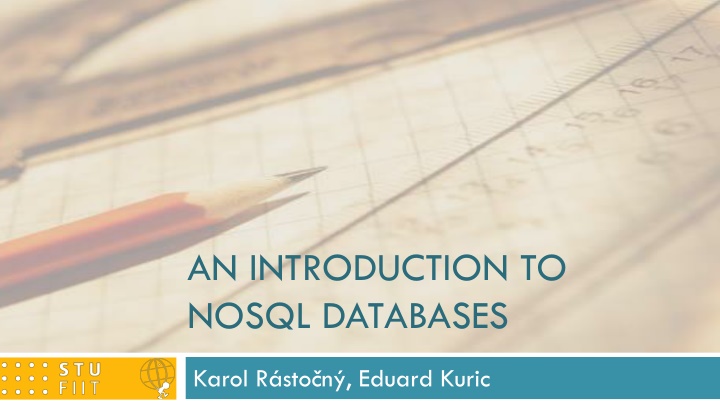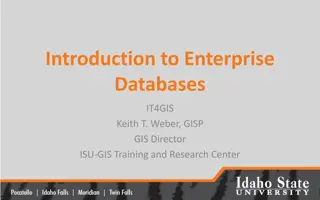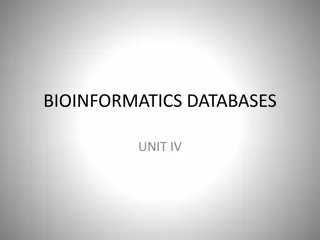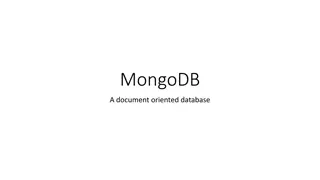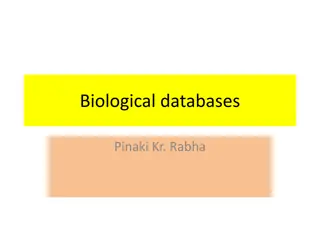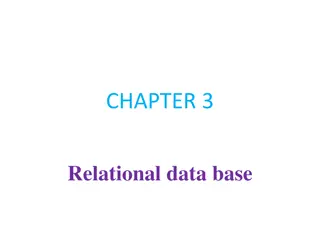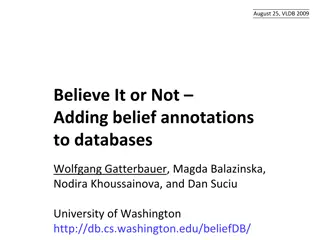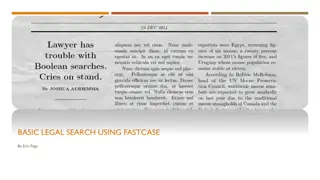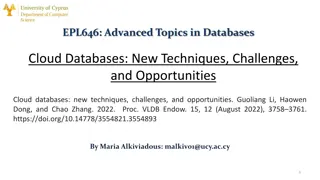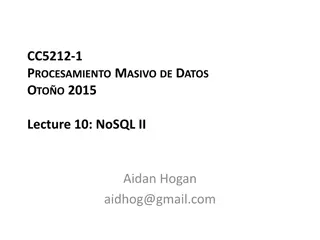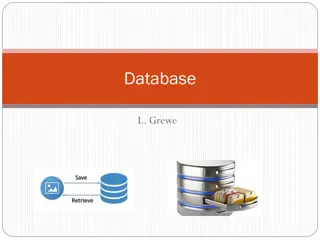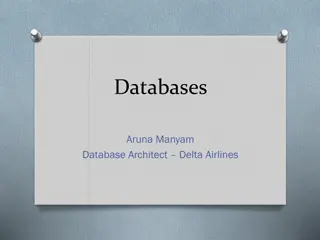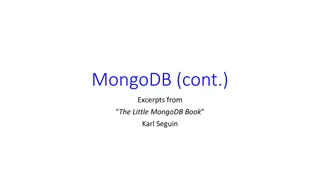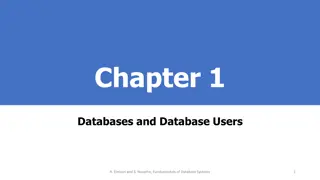AN INTRODUCTION TO NOSQL DATABASES
Dive into the world of NoSQL databases with this comprehensive guide covering the motivation behind NoSQL, classification of NoSQL databases, and an exploration of column-oriented, key/value, document, and graph databases. Discover how NoSQL databases offer solutions for handling big data, achieving horizontal scalability, enabling distributed computing and querying, and supporting concurrent access and consistency.
Download Presentation

Please find below an Image/Link to download the presentation.
The content on the website is provided AS IS for your information and personal use only. It may not be sold, licensed, or shared on other websites without obtaining consent from the author.If you encounter any issues during the download, it is possible that the publisher has removed the file from their server.
You are allowed to download the files provided on this website for personal or commercial use, subject to the condition that they are used lawfully. All files are the property of their respective owners.
The content on the website is provided AS IS for your information and personal use only. It may not be sold, licensed, or shared on other websites without obtaining consent from the author.
E N D
Presentation Transcript
AN INTRODUCTION TO NOSQL DATABASES Karol R sto n , Eduard Kuric
Motivation 2 Not stable data No fixed tables Big data Horizontal scalability Distributed computing/querying Concurrent access Consistency
What is NoSQL? 3 NoSQL = No + SQL More-accurately: Not Only SQL NoRel No relational
NoSQL Databases - Classification 4 Sorted Ordered Column-Oriented Stores Key/Value Stores Document Databases Graph Databases
Column-Oriented Stores 5 Contrast with row-oriented RDBMS Data unit Set of key(column)/value pairs Sorted by row-key (primary key) Nulls are not stored Columns are organized in column-families Name: FirstName, LastName, Location: Address, State, GPS
Column-Oriented Stores 6 Bigtable Google HBase Facebook, Yahoo!, Mahalo Hypertable Zvents, Baidu, Redif Cloudata
Key/Value Stores 7 Idea HashMap fast O(1) access Data unit: Key/Value pair Key string Value Basic types: int, string, Collections of basic types: set, list,
Key/Value Stores 8 Membase Zynga, NHN Redis Craigslist, Seznam, ALEF Dynamo Amzon Cassandra Facebok, Twitter, Digg Voldemort LinkedIn
Document Databases 9 Data unite: Document = Object Stored as a whole (not fragmented) JSON (BSON) notation Allows indexes on attributed
Document Databases 10 CouchDB Apple, BBC, Cern, PeWeProxy MongoDB Github, ForSquare, Shutterfly, Sourceforge
Graph Databases 11 Data unite: Node with relations to incident nodes Representation Set of triples object, predicate, subject Set of pointers to incident nodes
Graph Databases 12 AllegroGraph TwitLogic, Pfizer FlockDB Twitter Neo4j Box.net
Use cases 13 Access to attributes, computation over attributes Sorted ordered column-oriented stores Temporal store, frequent add/remove operations Key/Value stores Operations over whole objects Document databases Relations store, deduction Graph databases
Main Properties 14 Data modeling Querying Scalability Consistency
Data Modeling 15 No standardized data model Sorted ordered column-oriented stores Structure in class-families level Key/Value stores Data structures of collections Document databases Rudimentary class diagrams Graph databases Graph schema definitions
Querying 16 MapReduce Distributed computing and views generation Custom languages Mostly based on JavaScript SQL-like languages Apache Hive, HQL, CQL, SPARQL, Language bindings Apache Thrift, REST API, Java API, custom Drivers,
Scalability 17 Multi-master replication Data partitioning (shards) Fraud tolerance Limits Maximal number of rows, columns, column-families, documents, nodes, replicas, shards, Maximal size of index, data unit,
Consistency 18 Strong Consistency One master for write, multiple slaves for read Eventual Consistency Multiple write masters Updates are propagated in low load phases Consistency level Transaction, row, column, document,
Resources 19 Tiwari, S.: Professional NoSQL Comparison of NoSQL databases (http://kkovacs.eu/cassandra-vs- mongodb-vs-couchdb-vs-redis) Web sites of databases
Upcoming Presentations 20 Cassandra Eduard Kuric CouchDB PeWeProxy team Graph Databases Michal Holub MongoDB Karol R sto n Redis Alef team and a lot more (board is opened for everyone )
